- Home
- David Downing
Masaryk Station jr-6 Page 19
Masaryk Station jr-6 Read online
Page 19
That brought doubt to Hanzelka’s eyes, but he overrode it. ‘Please do.’
‘The Americans think I work for them. Occasionally I’m ordered to do something which strengthens their illusion.’
‘You are a double-agent?’ The Czech sounded surprised, though God only knew why.
‘Of course,’ Russell told him.
‘Well, well.’
The subordinate returned, and another exchange took place in Czech.
‘Comrade Rusikov is on his way,’ Hanzelka told Russell, who tried not to look too relieved. ‘Since we’re on the same side,’ the Colonel was saying, ‘you might as well tell me what you know about this operation.’
‘It looks like you know it all already.’
‘Most of it,’ Hanzelka conceded.
‘I was asked to collect some signed affidavits. Statements from people who witnessed Jan Masaryk’s murder.’
Hanzelka was smiling.
‘Fakes, I presume.’
‘How could they not be when Masaryk jumped?’
‘They were bait,’ Russell suggested.
‘Of course.’
They had probably rolled up half of Giminich’s organisation, Russell thought. Which felt strangely satisfying until he remembered the girl in the blue dress.
‘So, who was in charge of this operation?’ Hanzelka asked.
‘An Austrian named Volker Giminich.’
‘On his own?’
Russell was reluctant to name Winterman, who as far as he knew wasn’t a mass murderer. But neither did he want the Soviets to find out that he was keeping things from them. He opted for partial disclosure: ‘An American was in nominal charge, of course, but Giminich is running the show.’
‘He likes to do that,’ Hanzelka allowed.
‘You know him?’
‘He was based here during the war-one of Heydrich’s more zealous disciples.’
Russell wondered whether to reveal his own previous acquaintance with Giminich, and decided against it. His earlier visits to Czechoslovakia seemed like a can of worms best left unopened-he had no idea what had happened to the Czechs he had been involved with in 1939 and 1941, or whose side they might now be on. ‘The Americans have some strange allies,’ was all he said.
‘ “Strange” is not the word I would use to describe Volker Giminich.’
‘You know him better than I do,’ Russell said, realising it must be true. This Czech had a personal score to settle.
Rusikov’s arrival spared him the details. The MGB officer gave Hanzelka a warm handshake, and Russell something more perfunctory. For the next few minutes the conversation was conducted in Czech.
‘You will take the affidavits to Vienna as planned,’ Rusikov told Russell eventually.
He looked suitably surprised.
‘They won’t stand close scrutiny,’ Rusikov explained. ‘If the Americans publish them, we will have no trouble proving they are forgeries. People will assume one of two things, that the Americans forged them themselves, or that they were duped by their own supporters here in Prague.’
‘Okay, I’ll take them.’
‘You realise that Giminich must not know that any of his people have been arrested,’ Rusikov went on. ‘Some have already been turned, and we hope to entice him close to the border-so a snatch squad can bring him back here for trial.’
‘I understand,’ Russell said. And he did. Put Giminich in a Prague courtroom, and the new Czech authorities would be able to draw damning connections between Nazi war crimes, American spies, and the regime’s current domestic opponents. A real political bonanza.
The Soviets were so much better at this stuff than the Americans. If they had a cause worth fighting for they’d be damn near invincible.
‘You can still catch the night train,’ Hanzelka was telling him. ‘The lieutenant here’-he indicated the young man who had just arrived with Russell’s suitcase-‘;will take you to the station and make the arrangements.’
As they emerged on to Bartolomejska, where a car was waiting, Russell glanced back at the building. It seemed utterly anonymous; the grey walls and shuttered windows were a highly effective mask. Somewhere in the basement the girl in the blue dress would still be crying.
The lieutenant said nothing on their drive, but proved singularly efficient when it came to securing him a private sleeping compartment. Russell had concluded that he only spoke Czech, but at the carriage door the young man wished him ‘a safe journey, Comrade’, before striding almost jauntily back down the platform.
The train set off on time, its large locomotive convulsively blowing off steam. There was, Russell discovered, no restaurant or bar on board, so he spent the next fifteen minutes by an open window, enjoying the warm air on his face, gazing out at the dark countryside. Dark in more ways than one, he thought. He wouldn’t come this way again in a hurry.
Considering the terrible state of the track, sleep came quite easily, and when he finally woke they weren’t much more than an hour from Vienna. It was still only seven A.M. when he finished his breakfast in the Nordbahnhof buffet, so he took a taxi to Josefstadt, and sat enjoying the morning sunshine in a small park not far from the house on Florianigasse. He resisted the temptation to read the affidavits-if and when they blew up in Winterman’s face, he wanted the man to remember that the envelope had been sealed.
He knocked on the CIA’s door at nine A.M., and was surprised to find both Winterman and Giminich already at work. They were excited by the affidavits, and appreciative of his efforts, which at least made a change. They asked very few questions-their operation had gone according to plan, which was only to be expected. And no, there was nothing to detain him further. With the help of the duty officer downstairs he should be back in Berlin by evening.
As it turned out, that day’s flights were already full, but Russell was happy to spend another day in Vienna-his Rat Line story needed a few hours’ work, and it would be safer to send it on from there-Berlin’s channels of communication were less reliable and much less discreet. At the American Press Club he commandeered a typewriter, and spent most of the rest of the day turning his notes into a series of three articles that would, he hoped, embarrass the hell out of any institution with a moral compass. Whether the State Department and Vatican qualified as such was another matter.
After sending it all off to Solly Bernstein in London, Russell walked around to the Press Club. There he found an abandoned London Times, in which he learnt that the Nationalists had won the previous week’s election in South Africa. From earlier reports he knew that these were people who believed in keeping the country’s races apart, and apartheid was apparently the name of their creed, the Afrikaans for ‘separate development’. This was post-war progress, he thought-from Aryans murdering Jews to Aryans merely enslaving Negroes. And all in three short years!
After dinner in a local restaurant he walked over to the Central Exchange and purchased another illicit telephone call to Berlin. ‘I’ll be back tomorrow,’ he told Effi. ‘The flight from Frankfurt should reach Tempelhof around four, give or take an hour or so.’
Effi’s ‘thank God’ was a little too heartfelt.
‘What’s happened?’
‘Nothing. Not yet, anyway. Someone turned up at the door and suggested that Rosa’s adoption might not be legal.’
‘Who? When?’
‘Yesterday. He said he was from City Hall, and he probably was, but the Russians must be behind it. Thinking it over, I feel sure they’re just trying it on, but at the time I felt almost hysterical.’
‘I can see why.’
‘Well, I’m glad you’ll be back tomorrow. I’ll come to the airport.’
She sounded calm enough, but Russell could hear the tension in her tone. Next morning, as his military flight droned its way across Bavaria, he found himself willing the pilot to step on the gas, as if some inner voice was warning him that their time was finally running out.
Merzhanov
Berlin from the air
was more of a shock than Russell expected-either three months away had blunted his memory, or he’d just grown accustomed to cities that didn’t look like some fantastic giant had repeatedly hit them with an outsize hammer. There were signs of rebuilding, but they still seemed far too few for the time that had passed. One thing was certain-if the Fuhrer suddenly emerged from hiding, he would recognise the place.
Effi was waiting at the terminal doors, lovely as ever, eyes full of worry. Before taking the U-Bahn home they went for a walk in nearby Viktoria Park, where in pre-war days they’d often enjoyed the panoramic view from the top of the Kreuzberg. This time they eschewed the climb, circling the base of the hill as they discussed the latest Soviet behaviour.
‘You and Shchepkin can fix this, can’t you?’ Effi half-asked, half-pleaded.
Russell shrugged. ‘I hope so. I just don’t understand what anyone thinks they could gain from threatening us like this. It doesn’t make sense. And until it does, it’s hard to know what we should do about it. But I can’t believe they want to take Rosa away from us-they’re just trying to scare you. We just don’t know why.’
‘According to Shchepkin the two men who tried to take me for questioning were investigating Sonja Strehl’s death, but back in April the police were telling everyone that no investigation was needed. It must all have something to do with Sonja’s death-I can’t believe the Soviets are that upset about losing my services.’
‘They should be,’ Russell suggested gallantly, ‘but they probably aren’t. Shchepkin will be able to find out.’
‘I hope so. This feels worse than waiting for the Gestapo to turn up.’
Russell pulled her to him. ‘They won’t take Rosa away from us,’ he promised.
‘I’ll kill anyone who tries,’ she vowed.
‘We’ll do it together. Now, I have some bad news for your friend Lisa.’
Effi looked up. ‘Uschi’s not dead, is she?’
‘Far from it. She’s getting married in a couple of months. To a young Party zealot.’
‘And she isn’t the slightest bit interested in escaping to America,’ Effi guessed.
‘Precisely.’ Russell explained what had happened, and how the girl had thought herself abandoned. ‘I’ve got a letter for Lisa, and a picture of the happy couple.’
‘Oh dear.’ Effi looked at her watch. ‘It’s time we went to pick up Rosa. I’ll go and see Lisa tomorrow.’
As they walked back to the U-Bahn she told him that Zarah was cooking him a ‘welcome home’ meal, and that Thomas had been invited.
‘Just Thomas?’
‘Hanna’s still at her parents, and Lotte’s got a new boyfriend, another young zealot by all accounts. Thomas told her he was pleased with her romance. When she asked why, he told her the family needed all the political insurance it could get.’
‘Annaliese?’
‘She’s fine, positively glowing, as they say. But worried about Gerhard. She says he keeps muttering under his breath.’
Russell sighed. ‘He’s too honest for Ulbricht’s KPD. Have the Russians been acting up?’
‘Nothing serious.’
After collecting an excited Rosa, they dropped off Russell’s suitcase at the flat and continued on to Fasanen Strasse. Zarah was already cooking, and Thomas arrived not long after. It felt like a real homecoming to Russell, and the joy of seeing his family again was only slightly marred by the absence of his son, and the fear that soon they might all be scattered again. Catching Zarah alone in the kitchen, he offered congratulations for her and Bill’s engagement.
‘I’m sure Effi could get work in America,’ Zarah said, clearly unaware that some was already on offer. ‘And you know you could,’ she added, conveniently forgetting the devil’s bargain that held him in Berlin.
The thought of returning to America was far from unappealing, Russell thought later, although Zarah’s prospective hometown in Iowa was probably not the most obvious fit for Effi or himself.
He had another ‘welcome home’ the following morning at the Berlin Operations Base HQ in Zehlendorf. It wasn’t as warm or fulsome as the one on Fasanen Strasse, but still a big improvement on his usual reception in the villa above Trieste. His old Berlin boss Scott Dallin was long gone, and the current incumbent, Brent Johannsen, was less annoying than most of the Americans Russell had met in the Intelligence business. He looked as Scandinavian as his name suggested-tall, blond, and almost insulting handsome. Johannsen was quick on the uptake, impressively thorough, but rather too narrow-minded. He was ruthless enough when he had to be, but unlike some he didn’t seem to enjoy it.
Johannsen was in a talkative mood that morning. ‘This is top secret,’ he confided, with the air of someone who didn’t give a hoot how many people knew. ‘There was a high-level meeting yesterday in the British Sector-we really are going to bring in a currency reform.’
‘I don’t suppose the Russians were invited.’
‘No way. This reform’s coming, and soon. Before the month is out.’
‘Here in Berlin?’
‘Maybe, maybe not.’
Russell shook his head. ‘That’s not good enough. Whoever controls the currency runs the economy, and whoever controls the economy runs the country. If Washington leaves Berlin out, then they’re handing it to the Russians.’
Johannsen just shrugged. ‘That’s above my pay-grade. All I know is there’s no such thing as a secret meeting in Berlin, and the Russians will be fully briefed on this one. Which means trouble for us. They’ll want to get their retaliation in first.’
‘Probably,’ Russell agreed. He was wondering if this might be how the Americans meant to abandon Berlin, but he couldn’t really believe it to be true. That would be like admitting they’d finally lost the peace. Could they do that? If they could, then he really should send Effi and Rosa away.
‘When’s your next meeting with Ilych?’ Johannsen was asking. Ilych was Shchepkin’s codename.
‘We meet on Fridays.’
‘Well, see what you can get out of him. In the meantime, we’re fresh out of defectors, but seriously short-staffed. Martin Bronson’s on compassionate leave, and I’d like you to run Claptrap until he comes back.’
‘Fine,’ Russell agreed. After Trieste, BOB’s long-standing surveillance of VD-stricken Soviet officers would be refreshingly straightforward.
After reading her daughter’s letter, Lisa Sundgren stared blankly out at the busy Ku’damm, a solitary tear running down each cheek. Angrily wiping these away, she picked up the photograph and scanned it again, as if she might have missed something crucial. ‘I hardly recognise her,’ she said eventually.
‘It’s been a long time,’ Effi said.
‘I know, but what can I do?’ Lisa almost pleaded.
Go home, Effi thought, but that seemed too brutal an answer. ‘You have another daughter,’ she offered gently. This one is lost to you, she thought.
‘I know that, of course I do. But I can’t just walk away from Uschi, forget she exists. I can’t.’
‘It needn’t be forever. John thinks the situation will improve over the next few months, and then travel in and out will get easier.’
‘I can’t wait that long.’
‘I know,’ Effi said. She found herself remembering John’s stories of Irish children who’d emigrated to America in the past century, exchanged letters for decades, but never actually seen their parents again. Heartbreaking.
‘So what can I do?’ Lisa repeated, defeat in her tone.
‘Sometimes there’s nothing you can do. And John did say she seemed very happy.’
Lisa seemed almost to wince. ‘Well, that’s something. Everything really.’ She turned her gaze to the street again, where an overcrowded tram was passing. ‘There’s nothing worse than losing a child,’ she added, sounding almost surprised.
They parted with promises to keep in touch, but Effi doubted they would. When she got home there was a hand-posted letter from Max Grelling waiting for her on the mat.
He had samples of the documents she’d asked for, and now only needed a photograph of Uschi.
After lunch Russell took the U-Bahn south to Steglitz, where Operation Claptrap was based. A year into the peace BOB had stumbled across a biddable Polish doctor, set him up in his own VD clinic, and supplied him with enough precious penicillin to actually cure his patients. He didn’t need to advertise-catching VD was a court martial offence in the Red Army, and once word spread that relief was on offer in the privacy of the American sector, Russians of all ranks came flocking.
A fluent Russian-speaker, Doctor Kaluzny was given a camera for photographing any documents carelessly left in pockets or bags, and guidance in which questions he should casually ask the patients. He then filled in forms which his control-in this case, Russell-scoured for anything useful.
Reading the latest batch in a nearby bar, Russell found nothing of interest-just a stream of young men with identical physical symptoms, and the sort of complaints which life in any army tended to provoke. The prospect of a court martial certainly scared them, but mostly they were there because they were terrified their girlfriends at home would find out. When it came to military secrets, the best most could manage was the name of their sergeant.
When they were both in Berlin, Russell and Shchepkin usually met at the same time and place. Bad practice in theory, but since both sides knew of their meetings any attempt at subterfuge seemed gratuitous. So later that morning Russell made his usual trek to the northeastern corner of the Tiergarten, where the open black market had flourished in the immediate post-war years, and where a panoramic sweep of the eyes could take in the gutted Reichstag, a deforested park and the Soviet monument to the Unknown Rapist.
It was a warm day, and Shchepkin was wearing a lightweight charcoal suit and open white shirt. It was the first time Russell had seen him in daylight for more than three months, and the Russian looked a lot more drawn than he remembered.
‘A lovely day,’ was Shchepkin’s opening remark.

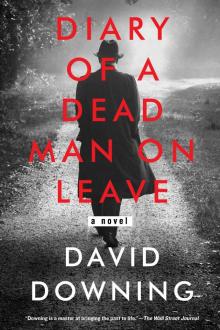 Diary of a Dead Man on Leave
Diary of a Dead Man on Leave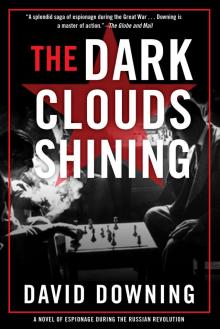 The Dark Clouds Shining
The Dark Clouds Shining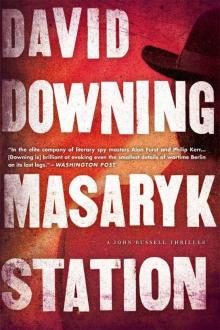 Masaryk Station (John Russell)
Masaryk Station (John Russell)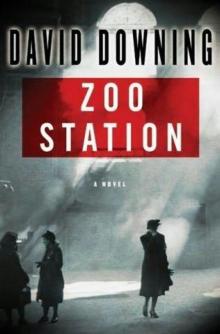 Zoo Stationee
Zoo Stationee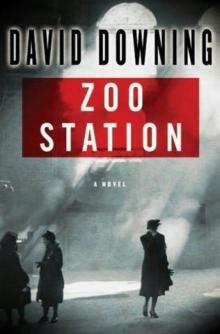 Zoo Station jr-1
Zoo Station jr-1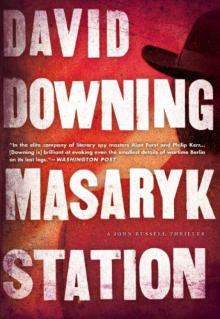 Masaryk Station
Masaryk Station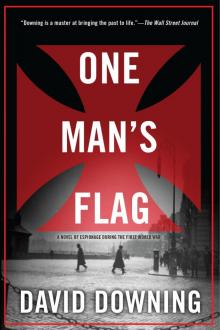 One Man's Flag
One Man's Flag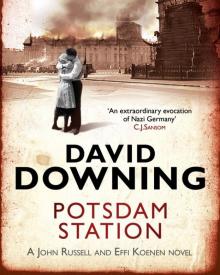 Potsdam Station jr-4
Potsdam Station jr-4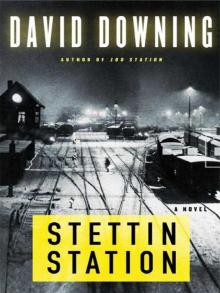 Stattin Station jr-3
Stattin Station jr-3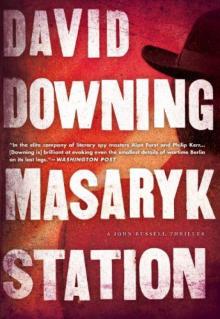 Masaryk Station jr-6
Masaryk Station jr-6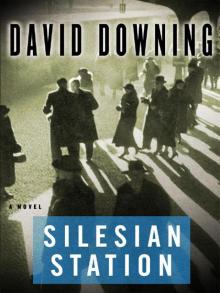 Silesian Station (2008) jr-2
Silesian Station (2008) jr-2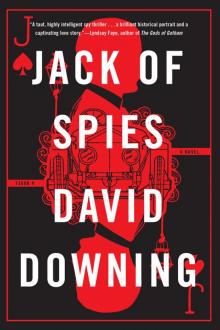 Jack of Spies
Jack of Spies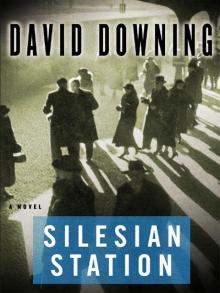 Silesian Station (2008)
Silesian Station (2008) The Moscow Option
The Moscow Option The Red Eagles
The Red Eagles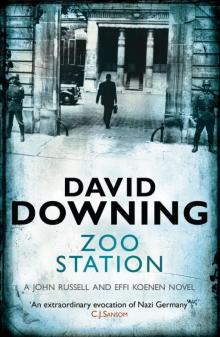 Zoo Station
Zoo Station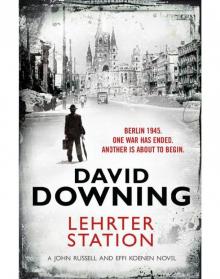 Lehrter Station
Lehrter Station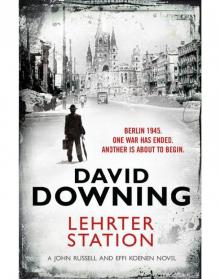 Lehrter Station jr-5
Lehrter Station jr-5